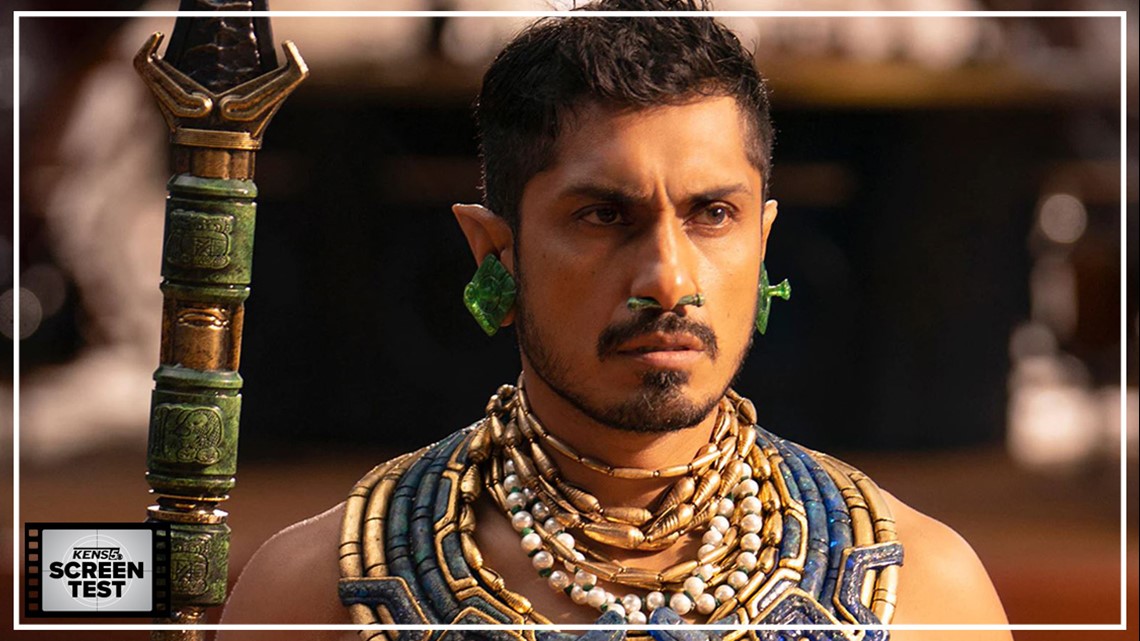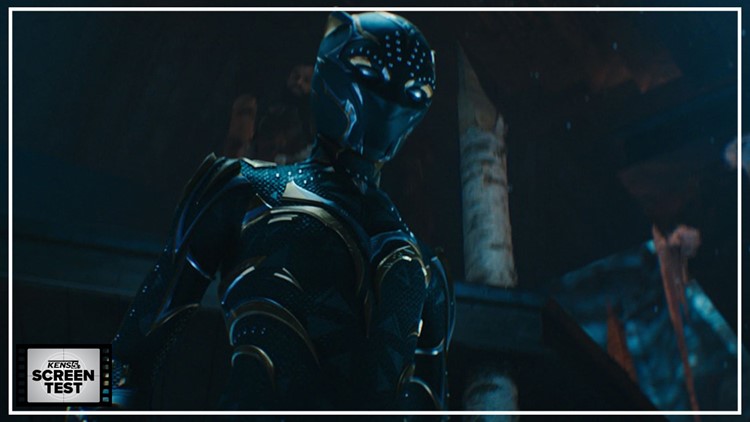TEXAS, USA — 2018’s “Black Panther,” the Ryan Coogler-directed epic that elegantly ushered a new civilization into the Marvel Cinematic Universe while establishing a new formula for franchise success, introduced its eponymous hero within 10 minutes, his midnight-black attire practically leaping off the letters of the Marvel Studios logo. Most of what you need to know about “Wakanda Forever” – its intentions, its challenges and its ambitions – are rooted in the fact that this sequel goes nearly its predecessor’s entire running time before we see a new Black Panther suiting up.
The movie’s marketing campaign is going to unusual lengths to keep the Wakandan guardian angel’s identity this time around a secret, though in actually watching “Wakanda Forever” you realize that mystery has less drama to it than watching midterm election results slowly roll in. Regardless, it’s far from the most pressing question facing Coogler and his collaborators in their long-awaited follow-up .Namely, how does “Wakanda Forever” navigate the loss of star Chadwick Boseman, who died suddenly from colon cancer in 2020?
It’s a loaded question, of course, made even more pressing because of the expectations that were already awaiting a sequel to one of the MCU’s most celebrated entries. And it’s practically impossible to consider it without pondering another at the same time: What does the modern standard-bearer in escapist entertainment do when it has to confront reality?
For Coogler, the answer is not to shy away from that reality. Instead the filmmaker – whose harrowing 2013 breakout “Fruitvale Station” defied traditional stories of Black trauma by showing us the man at the center of real-life tragedy – does something tricky. He attempts to weave the pain of Boseman’s death into maybe the most expensive movie ever made about the confusion of grief, while forging ahead on new requisite storytelling paths. For a franchise that has all but broken the fourth wall in its comedic aspirations, it says plenty that the most powerful moments of the bloated, slightly out-of-tune “Wakanda Forever” – the second-longest MCU outing to date – brings it crumbling down with an admission that even the most schematic of Hollywood projects needs some messiness to reveal its humanity.
Coogler is splitting his responsibilities of making a movie and paying tribute, and it starts from the jump. Gone is the trademark fanfare of the typically emphatic Marvel Studios logo as the opening pays silent, regal tribute to Boseman. The actual narrative does so in its own way, immediately clearing up the mystery of how Coogler and cowriter Joe Robert Cole would convincingly write their fiction around Boseman’s death. It’s an elegant, simple, moving prologue—and dramatic for how it immediately establishes stakes of a personal and universe-shaking kind.
Then… the plot gets churning. Hurriedly so, because damned if a Black Panther sequel took a feature-length break from the spectacle and requisite franchise-needle-threading to tell a story fully molded around loss, and the superheroism of a different kind that life often demands of us. “Wakanda Forever” does make ample time for such reflection, to be clear; at various moments we see returning warriors played by Winston Duke, Lupita Nyong’o and Danai Gurira embarking on their individual journeys making sense of T’Challa’s death, and it makes for graceful moments in an ambitious movie that lacks it the further it embarks on more typically blockbuster duties. Most immediately, we observe T’Challa’s mother, Queen Ramonda (Angela Bassett), and younger sister, Shuri (Letitia Wright), pondering the status of their kingdom without its protector.
It’s easy to see how the emphasis on that dynamic between Ramonda and Shuri might have been the biggest adjustment Coogler and Cole had to make following Boseman’s death. If that’s the case, their screenplay at least manages to find some symmetry with the 2018 movie the cowriters also wrote; where “Black Panther” sunk its claws into patriarchal bonds, its less-focused sequel mines conflict between a queen embroiled in international conspiracy to seize Wakanda’s ultrarare resource, vibranium, and a daughter who still can’t square the Black Panther’s invincibility with her brother’s absence a year later. In fits and starts “Wakanda Forever” continues the first movie’s dialogue about intergenerational burdens in the face of great power and responsibility.
If only the gears of its script were made of vibranium. Plot machinations grind and grind and grind, occasionally slowing for a moving reunion or biting emotional reckoning over the still-stinging loss of King T’Challa. These are oases amid huge gasps of exposition and too-brief wheezes of Wakandian splendor, the script opting to hop around the map instead of showing us new corners of the passionately rendered African realm. Coogler indulges in some horror-lite flair in a stunning early sequence that teases what’s to come, but otherwise the movie’s first 90 minutes cry out to be shaved down. Its sheer busy-ness sets off smoke that might be culpable for why nighttime scenes look so hazy, at times to the point I was squinting my eyes even in IMAX.
Certainly you hear the performance of MCU newcomer Tenoch Huerta before you see it. As chief antagonist Namor, a Mesoamerican deity who rules the underwater and out-of-sight city of Talokan, he’s a formidable antagonist through whom Coogler doubles down on the volatility of vengeance, making him a mirror reflection of sorts for Shuri. The world’s greedy clamoring for vibranium has awoken in Namor a slumbering hatred for “the surface world,” and in some fairly weightless flashback scenes we learn about how concerns of self-preservation have perhaps been used to mask crueler intentions.


If only Namor had linked up with Killmonger, Michael B. Jordan’s charismatic villain from the 2018 film. He returns in a fantastic sequence that sees “Wakanda Forever” at its most interrogative, Coogler and Cole tying his motivations into an anger that bites at the edges of Shuri’s journey; most of the action revolves around her, and the leap Wright had to take from spunky supporting player to iron-willed protagonist. She’s largely up to the task, underscoring her emotional restlessness with careful curiosity about the atrocities faced by Namor even after he delivers threatening ultimatums to her homeland. When the wing-footed foe rallies Talokan troops ahead of the climactic showdown – a neatly organized but confusingly shot set piece serving as a nice appetizer to “The Way of Water” – the vibe is borderline apocalyptic.
Even so, “Wakanda Forever” can be ideologically inconsistent in regards to what motivates its characters, if not uninterested in delving fully into what they stand for in a given scene. Making the ill-balanced execution even more frustrating is the movie’s propensity to suffocate its own potential; it spends more time on a forgettable new character that’s good for little more than being an Iron Man stand-in as it does breathing life into its core ideas, and it’s far too easy to single out which colored-outside-the-lines scenes Kevin Feige insisted that Coogler shoot in order to remind us that, yes, there’s still a bigger picture to tie into. It’s tough to invest in a bloated sidebar at MIT when an ostensibly seismic revelation about the existence of vibranium is delivered with a whimper.
And yet, in something of a miracle, Coogler and company manage to bring themselves almost all the way back around to the deep-seeded sincerity of the original—only this time with sparks of ferocity that more often than not feel cheaply manufactured in other MCU stories. Above all else, the various parts of an excellent ensemble are written from the narrative baseline that all the might in the world can’t provide easy answers in the wake of death. As these characters inevitably forge ahead, that might be the very thing that gives the “Black Panther” subuniverse new life.
"Black Panther: Wakanda Forever" is rated PG-13 for sequences of strong violence, action and some language. It opens in theaters Friday. Runtime: 2 hours, 41 minutes.
Starring: Letitia Wright, Angela Bassett, Lupita Nyong'o, Danai Gurira, Tenoch Huerta
Directed by Ryan Coogler; written by Coogler and Joe Robert Cole
2022
---
MORE REVIEWS:
- ‘Causeway’ Review: Jennifer Lawrence, Brian Tyree Henry elevate scrappy story about two souls on the mend
- ‘Wendell & Wild’ Review: Henry Selick's thrilling return recalls a more thoughtful side of animated filmmaking
- ‘Till’ Review: Historical American horror, delicately told
- Movie review: Halloween Ends
- ‘The Banshees of Inisherin’ Review: Martin McDonagh's most searing film is a breakup comedy of a different sort
- Movie review: Amsterdam
- Fantastic Fest Review: Is ‘All Jacked Up and Full of Worms’ a practical joke, a dark descent or both?



